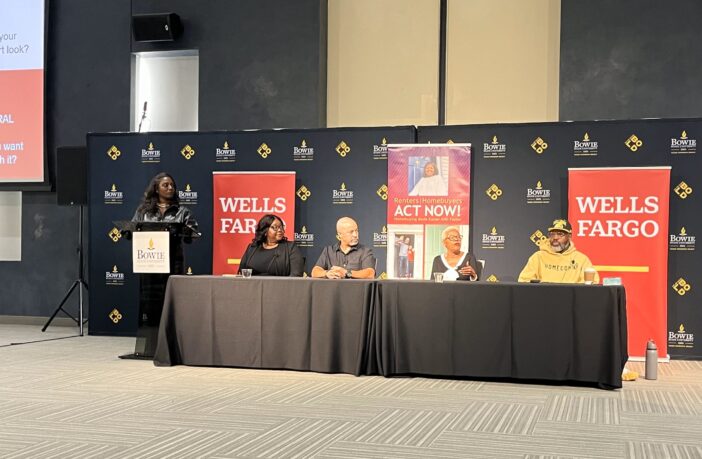HomeFree USA chief people officer Milan Griffin, left; Sonya Dease, housing and financial counselor; Darryl Bell; who played Ron Johnson Jr. on “A Different World;” Donna Greene, vice president senior business development consultant for Wells Fargo; and Kadeem Hardison, who played Dwayne Wayne on “A Different World;” lead a panel on homebuying. The discussion took place at Bowie State University on Oct. 17. (Photo credit: Megan Sayles/AFRO News)
By Megan Sayles
AFRO Business Writer
msayles@afro.com
HomeFree USA, a leading homeownership development and financial coaching organization hosted a homebuyer workshop on Oct. 17 at Bowie State University. The organization is approved by the Department of Housing and Urban Development, and the workshop was done in collaboration with Wells Fargo. The event was designed to show renters how to purchase a home affordably, address credit issues, obtain mortgage approval and secure down payment assistance.
Actors Kadeem Hardison and Darryl Bell from the hit sitcom “A Different World” served as panelists at the workshop, sharing their experiences with homeownership and giving guidance to students.
“One of the key factors of building wealth is homeownership. When it comes to buying a home many of you may be thinking you’re too young to be in the homebuying process right now,” said Milan Griffin, chief people officer at HomeFree USA. “It’s important to think about these opportunities so you can start getting yourself together now for when you are ready to buy a home.”
There is a steep divide between homeownership for Black and White Americans. According to the National Association of Realtors, 44 percent of African Americans are homeowners compared to 72.7 percent of their counterparts. The rate of homeownership for the Black community has also only increased by 0.4 percent in the last decade.
As homeownership is a pathway to wealth, homeowners significantly surpass renters in net worth.
“Homeowners are 40 times wealthier than renters. Homeowners have a net worth of $300,000 in wealth versus a renter who has $8,000 in wealth,” said Griffin. “No shade to renters, but renting is a pathway to broke-ness. I didn’t say poverty, I said being broke. Being broke is waking up every day, going to work, coming home, getting a paycheck and not having anything to show for it.”
As homeowners make mortgage payments, they generate equity, which can be leveraged to pay off student loans and other debts, start or expand a business, settle medical bills and finance other large expenses. Homes also appreciate in value over time, which also boosts equity.
But, many people have fear surrounding the homebuying process. Some common concerns include a lack of savings, poor credit, affording down payment and closing costs and managing a mortgage with other debts.
“A home is often the largest investment you’ll make in your lifetime. For most people, it is also the first and singularly most important cornerstone in building a stable financial future,” said Bell. “Not only is a home where you live, but it’s how you can manage your finances for prosperity.”
The workshop pointed to several resources that make homebuying more affordable. Two included Wells Fargo’s Homebuyer Access grant, which provides $10,000 in down payment assistance, and the Dream. Plan. Home. program, which delivers up to $5,000 toward closing costs. States and counties also have various grant programs for first-time homebuyers. Some can even be layered on top of one another to maximize savings.
Pre-purchase counseling is also available to individuals looking to buy a house whether through state programs or organizations, like HomeFree USA and Wells Fargo. It covers topics, like creating a budget, obtaining a mortgage, the costs associated with homeownership, preventing foreclosure and managing credit.
“If we don’t own our minds, our bodies and our homes, we will forever be broke,” said Griffin. “It is about time that our communities stop giving all the money away to everybody else, and we keep it in and grow it for our families and community.”



